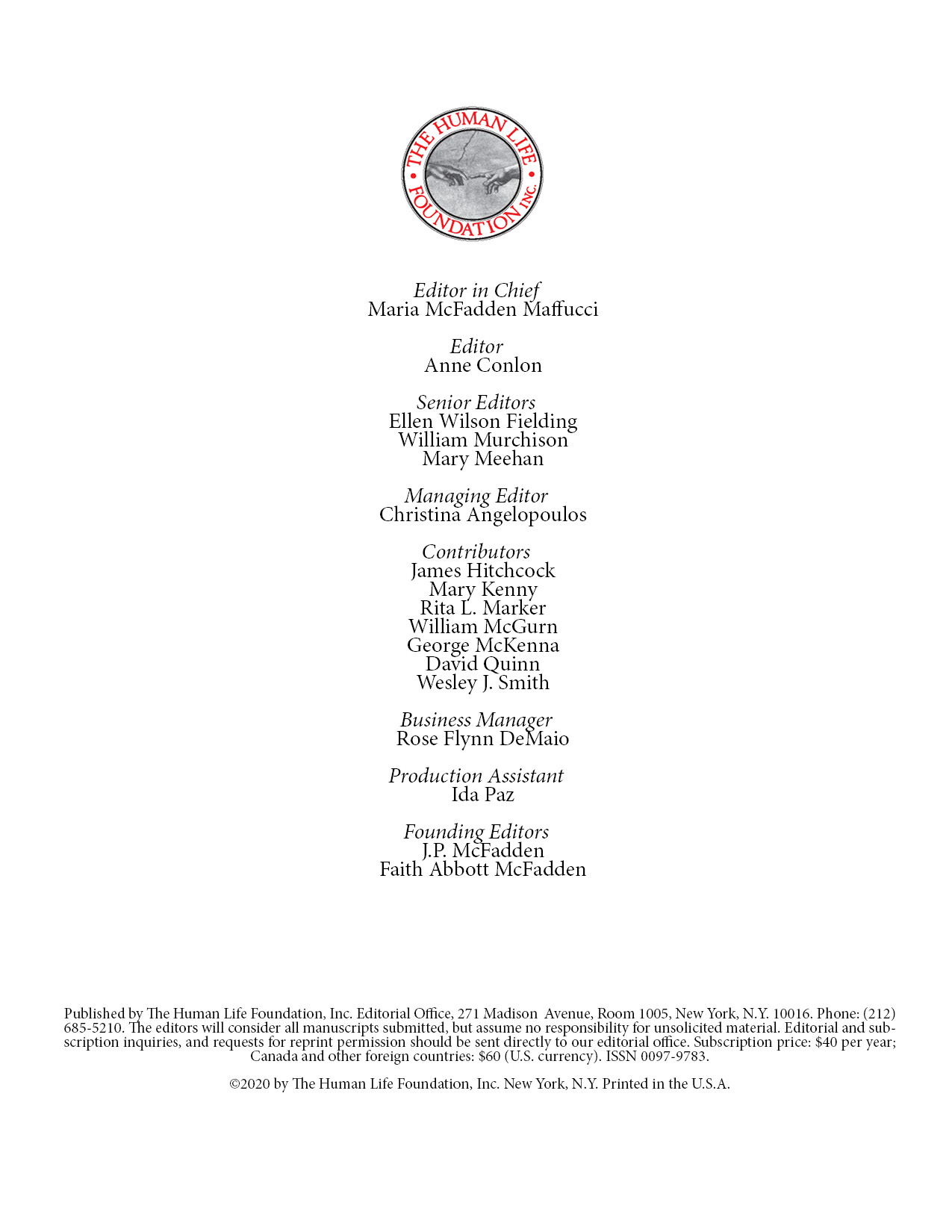|
|
 -
About this issue …
Last time I wrote that we hoped the Spring issue would be the “first” and “only—of its kind: assembled and edited during a massive international pandemic and quarantine.” Yet here we are, in summer, and Americans from coast to coast, as Peter Pavia writes, are enduring the “toxic trident of the coronavirus pandemic, the specter of economic ruin, and the quaintly dubbed social unrest”—anarchy and violence in our cities. (“Good Humor and the Illusion of Control,” p. 76). Things are blessedly better contagion-wise here in New York; we pray it lasts.
We’re still working separately, from our homes, and there are risks to not getting together in person to vet copy, etc. So, a mea culpa for our esteemed contributor Brian Caulfield, whose article “Suicide and the Church,” a powerful presence in the issue, is missing from the Spring Review’s front cover. (We have corrected it online.) Several articles here focus on “The Coronavirus Revolution” (William Murchison’s lead essay) that has altered our daily landscape (“Masks. Tests. Reports of Vaccine Trials. Sourdough Bread. Jigsaw puzzles.”). Among the thousands who have died are those who could have been protected; Anne Hendershott reports on the deplorable policies that led to tremendous loss of life in nursing homes and abortion clinics. We also explore welcome non-virus topics: the pro-life advocacy of a saint and a near-saint—Patrick Mullaney on Mother Teresa and William Doino Jr. on Dorothy Day—and the current legal status of the decades old ERA. We even take you, dear reader, to Mars! Ellen Wilson Fielding’s marvelous essay, “Leaving Home: Making Plans to Abandon Mother Earth,” may read like science fiction, but it’s an all-too-real report on some high-tech moguls’ master plans. We welcome three new contributors: Drew Letendre, whose “Keeping Up with the Cuomos” puts sons Andrew and Chris in their proper places; Dmitri Solzhenitsyn (Appendix F, reprinted thanks to National Review Online), who writes about the disproportionate maternal mortality rate in the African American community; and Jane Sarah, whose “Good Things Happen When Medicine Gets Personal” is in From the Website.
Our thanks to The Catholic Thing, First Things, Newsmax, and National Review Online for their kind permission to reprint the columns in our appendices, some of which discuss the recent demoralizing news from the Supreme Court—ruling for the bloody abortion business in June Medical Services v. Russo, and against biological reality re transgenderism (Hadley Arkes’ Appendix A). Setbacks for sure, but as O. Carter Sneed reminds us in Appendix C, “quitting is not an option.”
The law is not the only front in the greatest struggle of our lifetime, one the Review is honored to serve. I’ll end with a prayer from St. Thomas More, whose advice Mr. Pavia urges us to heed: “Grant me, O Lord, a sense of good humor. Allow me the grace to be able to take a joke, to discover in life a bit of joy, and to be able to share it with others.” Cartoonist Nick Downes allows us to share a bit of joy and good humor with you—bless him!
Maria McFadden Maffucci
Editor in Chief
- For months we have been publicly preoccupied with death. Not a common experience for most Americans, culturally conditioned as we are to put death out of mind—and sight. But in late winter came “The Coronavirus Revolution,” as senior editor William Murchison calls it in our lead article, and since then the media have trumpeted the deaths of hundreds of thousands of people worldwide and the infected status of millions more. Before last March, recalls Murchison, we tended to see life as “just more of the same damned thing; more work, more striving, more friends on Facebook.” But “the scourge of coronavirus has caused 21st-century humanity to think hard about life itself.” Just possibly, he muses, we could emerge from this unanticipated mortal encounter “with refreshed understanding of what it means to participate in existence.” And with deeper appreciation, not for the “pride and self-satisfaction” that fueled our former behavior, but for humility, “the sense of one’s own finitude . . . of one’s smallness” in the vast expanse of human endeavor.
Read Full Intro
|
